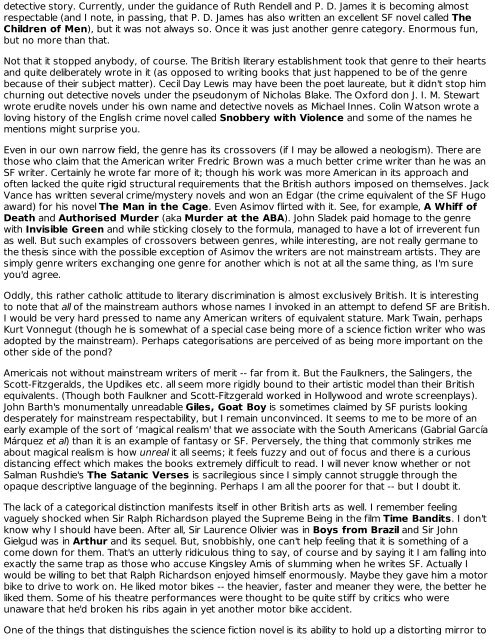Triffids Beard 2 - The Bearded Triffid
Triffids Beard 2 - The Bearded Triffid
Triffids Beard 2 - The Bearded Triffid
You also want an ePaper? Increase the reach of your titles
YUMPU automatically turns print PDFs into web optimized ePapers that Google loves.
detective story. Currently, under the guidance of Ruth Rendell and P. D. James it is becoming almost<br />
respectable (and I note, in passing, that P. D. James has also written an excellent SF novel called <strong>The</strong><br />
Children of Men), but it was not always so. Once it was just another genre category. Enormous fun,<br />
but no more than that.<br />
Not that it stopped anybody, of course. <strong>The</strong> British literary establishment took that genre to their hearts<br />
and quite deliberately wrote in it (as opposed to writing books that just happened to be of the genre<br />
because of their subject matter). Cecil Day Lewis may have been the poet laureate, but it didn't stop him<br />
churning out detective novels under the pseudonym of Nicholas Blake. <strong>The</strong> Oxford don J. I. M. Stewart<br />
wrote erudite novels under his own name and detective novels as Michael Innes. Colin Watson wrote a<br />
loving history of the English crime novel called Snobbery with Violence and some of the names he<br />
mentions might surprise you.<br />
Even in our own narrow field, the genre has its crossovers (if I may be allowed a neologism). <strong>The</strong>re are<br />
those who claim that the American writer Fredric Brown was a much better crime writer than he was an<br />
SF writer. Certainly he wrote far more of it; though his work was more American in its approach and<br />
often lacked the quite rigid structural requirements that the British authors imposed on themselves. Jack<br />
Vance has written several crime/mystery novels and won an Edgar (the crime equivalent of the SF Hugo<br />
award) for his novel <strong>The</strong> Man in the Cage. Even Asimov flirted with it. See, for example, A Whiff of<br />
Death and Authorised Murder (aka Murder at the ABA). John Sladek paid homage to the genre<br />
with Invisible Green and while sticking closely to the formula, managed to have a lot of irreverent fun<br />
as well. But such examples of crossovers between genres, while interesting, are not really germane to<br />
the thesis since with the possible exception of Asimov the writers are not mainstream artists. <strong>The</strong>y are<br />
simply genre writers exchanging one genre for another which is not at all the same thing, as I'm sure<br />
you'd agree.<br />
Oddly, this rather catholic attitude to literary discrimination is almost exclusively British. It is interesting<br />
to note that all of the mainstream authors whose names I invoked in an attempt to defend SF are British.<br />
I would be very hard pressed to name any American writers of equivalent stature. Mark Twain, perhaps<br />
Kurt Vonnegut (though he is somewhat of a special case being more of a science fiction writer who was<br />
adopted by the mainstream). Perhaps categorisations are perceived of as being more important on the<br />
other side of the pond?<br />
Americais not without mainstream writers of merit -- far from it. But the Faulkners, the Salingers, the<br />
Scott-Fitzgeralds, the Updikes etc. all seem more rigidly bound to their artistic model than their British<br />
equivalents. (Though both Faulkner and Scott-Fitzgerald worked in Hollywood and wrote screenplays).<br />
John Barth's monumentally unreadable Giles, Goat Boy is sometimes claimed by SF purists looking<br />
desperately for mainstream respectability, but I remain unconvinced. It seems to me to be more of an<br />
early example of the sort of ‘magical realism' that we associate with the South Americans (Gabrial García<br />
Márquez et al) than it is an example of fantasy or SF. Perversely, the thing that commonly strikes me<br />
about magical realism is how unreal it all seems; it feels fuzzy and out of focus and there is a curious<br />
distancing effect which makes the books extremely difficult to read. I will never know whether or not<br />
Salman Rushdie's <strong>The</strong> Satanic Verses is sacrilegious since I simply cannot struggle through the<br />
opaque descriptive language of the beginning. Perhaps I am all the poorer for that -- but I doubt it.<br />
<strong>The</strong> lack of a categorical distinction manifests itself in other British arts as well. I remember feeling<br />
vaguely shocked when Sir Ralph Richardson played the Supreme Being in the film Time Bandits. I don't<br />
know why I should have been. After all, Sir Laurence Olivier was in Boys from Brazil and Sir John<br />
Gielgud was in Arthur and its sequel. But, snobbishly, one can't help feeling that it is something of a<br />
come down for them. That's an utterly ridiculous thing to say, of course and by saying it I am falling into<br />
exactly the same trap as those who accuse Kingsley Amis of slumming when he writes SF. Actually I<br />
would be willing to bet that Ralph Richardson enjoyed himself enormously. Maybe they gave him a motor<br />
bike to drive to work on. He liked motor bikes -- the heavier, faster and meaner they were, the better he<br />
liked them. Some of his theatre performances were thought to be quite stiff by critics who were<br />
unaware that he'd broken his ribs again in yet another motor bike accident.<br />
One of the things that distinguishes the science fiction novel is its ability to hold up a distorting mirror to


